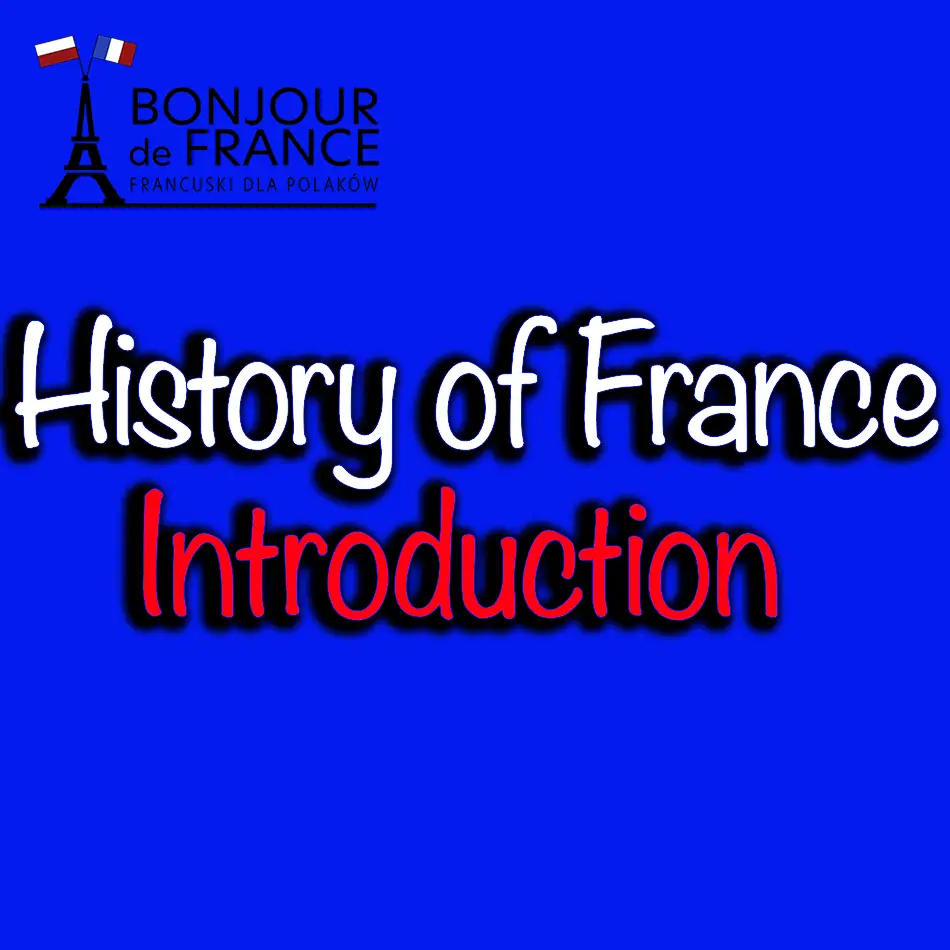
The history of France is rich and full of fascinating events that have influenced Europe and the world. Over the centuries, France has gone through many periods, from the Middle Ages through the French Revolution to the present day.
The beginnings of History of France
The beginnings of French history dates back to the times of the Gauls, who inhabited today’s territory of France as early as the 5th century BC. In the 2nd century B.C.E. The Romans conquered this part of Europe and created the Roman province of Gaul. After the fall of the Roman Empire in the 5th century CE. these areas were conquered by the Germanic tribes of the Franks, who over time transformed into a state called the Franks.
In the Middle Ages, France was one of the most powerful countries in Europe. In the 14th century, King Louis X reigned, who carried out legal reforms and was called “just”. During this time, France also went through the Hundred Years’ Wars, which were fought between France and England from 1337 to 1453. These wars ended with the victory of France and the strengthening of its position in Europe.
France in the 16th century
In the 16th century, France experienced a Renaissance period, with Kings Francis I and Henry II being patrons of the arts and culture. At that time, there were also religious conflicts between Catholics and Huguenots (Protestants), which led to the massacre on the night of St. Bartholomew in 1572. In the 17th century, the Bourbon dynasty took power in the country, and France reached the peak of its power under the rule of Louis XIV, who reigned in the years 1643-1715. Louis XIV carried out many reforms, including the centralization of power and the development of industry, and his rule is called “the era of great absolutism.”
In the 18th century, France was the site of the French Revolution that broke out in 1789. The revolution brought the fall of the monarchy and the French First Republic was established in its place. During this period, there were also the Napoleonic Wars, which began in 1799 and lasted until 1815. Napoleon Bonaparte, who took power in 1799, conquered many European countries, but was finally defeated by the anti-Napoleonic coalition at the Battle of Waterloo.
France in the 19th century
France in the 19th century was one of the leading countries in Europe and was equally threatening to Great Britain with its colonial power. During this time, France went through many political and social changes. In 1848 popular uprisings broke out, and in 1870 there was a Franco-Prussian war, as a result of which the German Empire was established. In 1914, France was drawn into World War I, which claimed millions of lives and changed the face of Europe.
France in the 20th century
In the 20th century, France went through many changes, including World War II when the country was occupied by Germany. During the war, the Resistance Movement was active in France, and after the war, France became one of the founders of the European Union. In the 1950s and 1960s, France went through a period of rapid social change, including the sexual revolution and feminist movements.
In the 1980s and 1990s, France moved towards market liberalization and privatization, and in 1992 it signed the Maastricht Treaty, which created the European Union. In the 21st century, France remains one of the leading countries in the world, and its culture, art and literature have a huge impact on the world stage.
In conclusion, France’s history is long and rich, and its influence on world culture, politics and economy is hard to overestimate. France has gone through many periods, from the Middle Ages to the Revolution and the post-war period, and its legacy is alive and influential to this day.
In addition, France is known for many outstanding figures who have influenced world history, such as Napoleon Bonaparte, Louis XIV, Victor Hugo and Marie Curie. They have influenced various areas of life, from the military to literature and science, and their legacy continues through the next generations.
France is also known for its rich culture and arts, including painting, music, film and theatre. Many French artists, such as Claude Monet, Édith Piaf or François Truffaut, achieved international fame and influenced the development of their fields of art.
France in the 21st century
Currently, France is a parliamentary republic, and its president performs mainly a representative function. The country is a member of the European Union, the United Nations, NATO and other international organizations. France is also one of the leading countries in the world in terms of economy, tourism and science.
Nowadays, France is also home to many cultural and sporting events, such as the Tour de France, the European Football Championship, as well as numerous film and music festivals. This country attracts tourists from all over the world who eagerly visit its monuments, museums, vineyards and beaches.
All in all, France’s history is rich and influential, and its heritage in culture, science and the arts is still present around the world. France is also a major player in today’s world politics and economy and destinations
aimeralleramourAutobusy i tramwaje we FrancjiautostradyAutostrady płatneavoirbagietkaBezpieczeństwo drogowebonjourBordeauxBretaniacroissantczasczasownikczasownikaedukacjaEkologia w transporcie drogowymFestiwalefiszkiFrancjafrancuskifrancuskiefrancuskie drogiFrancuskie marki samochodowefrançaisgramatykagramatyka francuskaHistoriahistoria FrancjiInfrastruktura drogowa we Francjijedzeniejęzykjęzyk francuskikomunikacjaKorki drogowe we Francjikrzyżówkakuchniakuchnia francuskakulturakultura francuskaKultura jazdy we FrancjiLiteraturaLuwrLyonmangerMarsyliamercimiłośćmotsmuzeanaukanauka francuskiegonauka językanauka języka francuskiegoNiceanonodmianaOuiParyżPojazdy elektryczne we FrancjiPolityka transportowaporannapracaPrawo jazdy we FrancjiProwansjaPrzepisy drogowe we FrancjiRatatouilleSamochody rodzinne we FrancjisztukasłownictwoteraźniejszytradycjaTransport drogowyusługi kurierskiewakacjeWieża Eifflawinowymowazabytkićwiczenia








